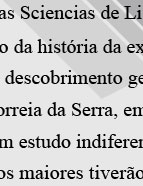

................................
However, hardly anything was known: "There were few national writers to consult, and those available were generally incomplete, sometimes discrepant in their narrations, and always sparse in terms of fifteenth-century news, which called for further research and confirmation. (Ibid., pp. 47-48) Always in the exercise of whimsical erudition. Almost simultaneously, other contributions emerged, first from the Viscount of Santarém, with his Atlas and the publication of the recently discovered Parisian manuscript of the Crónica do descobrimento e conquista da Guiné [Chronicle of the discovery and conquest of Guinea]by Gomes Eanes de Zurara, in Paris, in 1841, and then the very famous and useful Démonstracion des droits qu'a la couronne de Portugal sur les territoires situés sur la côte occidental d'Afrique... Historical arguments were needed to justify territorial claims. Both authors glorified - and mythicised - the figure and the work of Infante D. Henrique [Prince Henry the Navigator]. (M. I. João, O Infante D. Henrique...[Prince Henry the Navigator], 1994, p. 20) From the outset, it was necessary to distinguish the real from the imaginary and confront those who belittled Portugal's achievements. The priority of the Portuguese in navigating to the previously unknown had to be clearly stated and defended.
Even in propaganda works, history played a central role in every single argument employed in all colony-related material. This was a relevant subject on the eve of major European decisions - the Brussels (1876) and Berlin (1884-1885) conferences. Politics and economics were the main issues of focus, albeit always based on a historical account while trying to broaden the scope of geographical and historical knowledge – frequently referred to as historical-ethnographical to make up for the lack of documents on the African populations. It was important to get to know the latter now, not to simply exploit them.
It was felt that the Portuguese colonial heritage in Africa needed to be defended through historical justification - published and disseminated so that it would come to the attention of other interested European powers - so that it could be diplomatically and effectively achieved. Its enhancement was crucial and it needed to be made visible to other colonialist countries through overland exploration expeditions (A. Guimarães, Uma corrente...[A trend …], 1984). Indeed, to a certain extent, both lines of defence - the intellectual/historical and the political – were reconciled in the Sociedade de Geografia de Lisboa [Lisbon Geographical Society].
